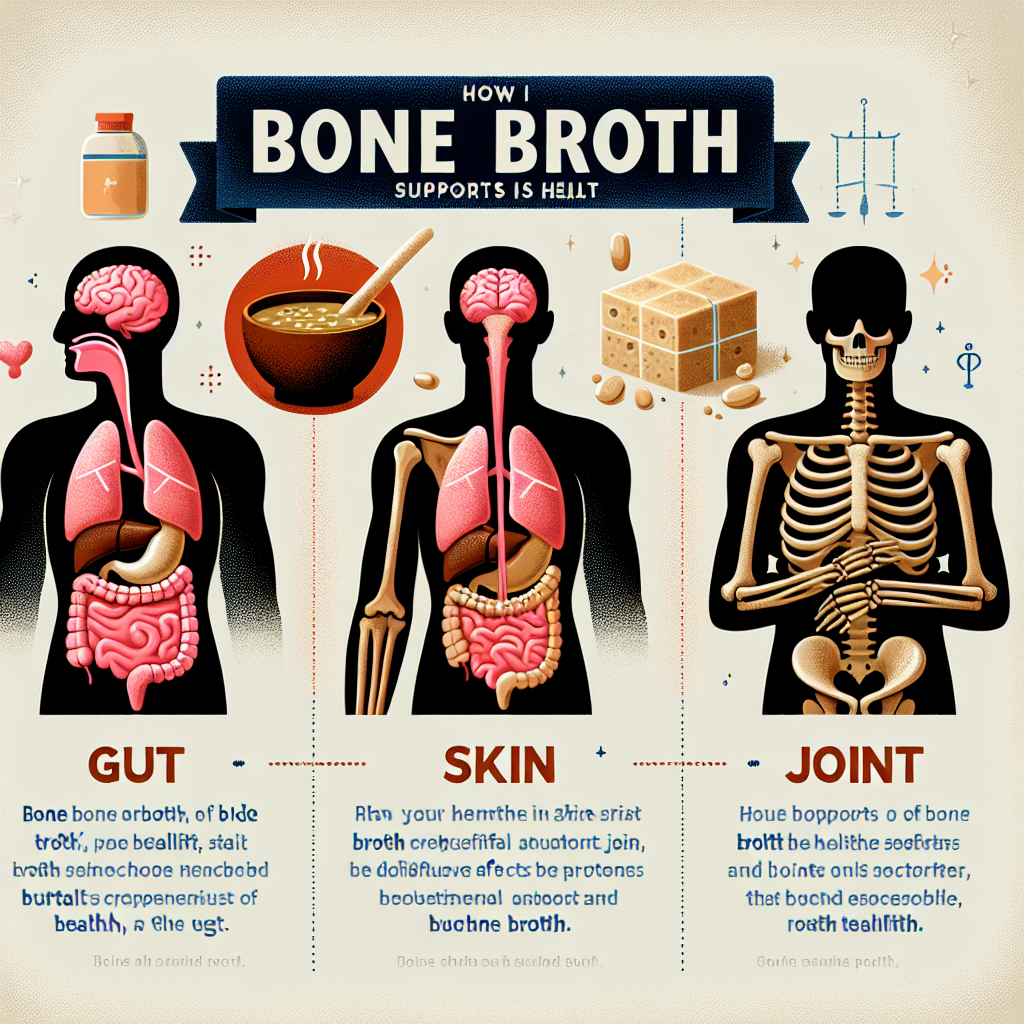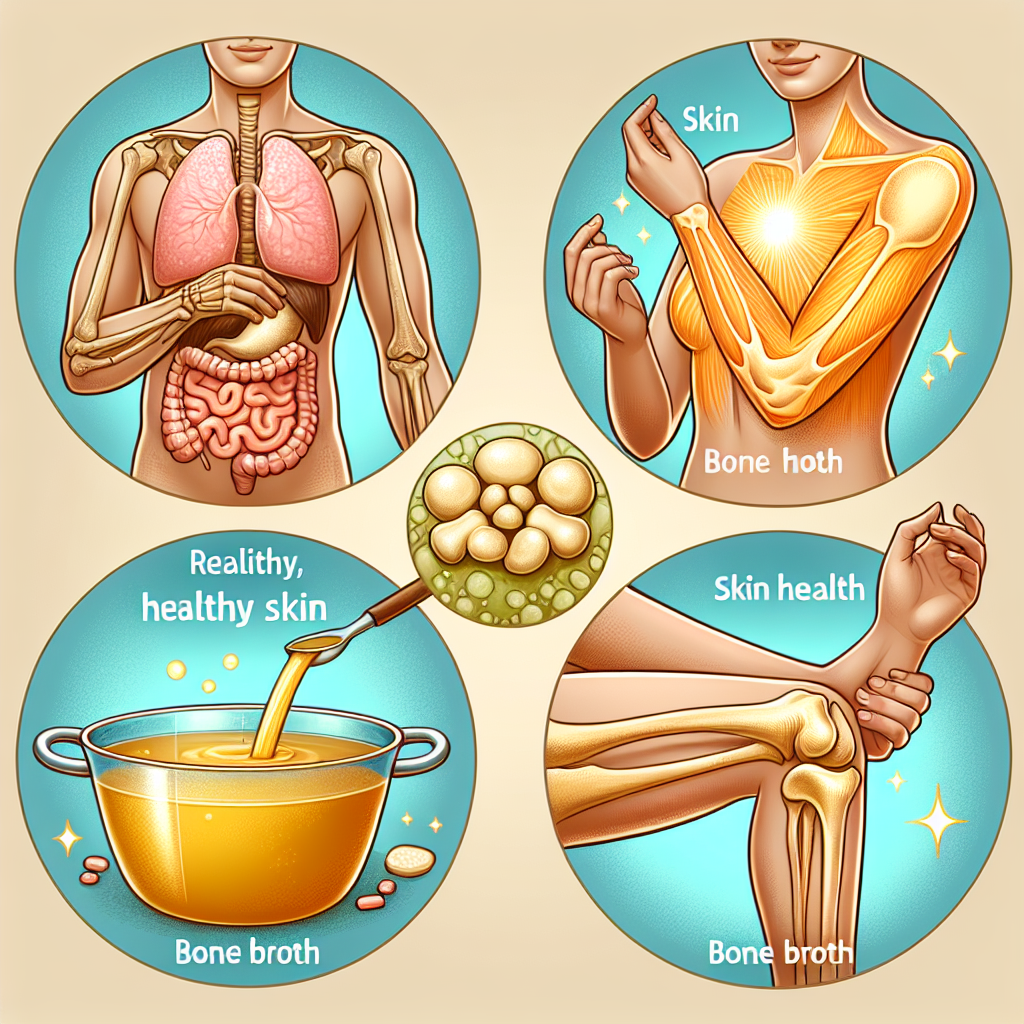How Bone Broth Supports Gut, Skin, and Joint Health

Discover the amazing benefits of bone broth for your gut, skin, and joint health. Packed with essential nutrients, bone broth can help improve digestion, promote healthy skin, and support joint function. Don’t wait, start your journey to better health today. Learn more here.
Exploring the Benefits of Bone Broth for Gut Health
Bone broth, a traditional food that has been consumed for centuries, is gaining renewed attention in the health and wellness community for its myriad of health benefits. Among the most notable of these benefits are its positive effects on gut health, skin vitality, and joint function.
Bone broth is made by simmering animal bones and connective tissues for an extended period of time. This process allows the bones and tissues to release healing compounds like collagen, glutamine, glycine, and proline. These compounds have the power to transform your health, particularly when it comes to the gut, skin, and joints.
Starting with gut health, bone broth is a powerhouse. The gelatin in bone broth heals the lining of the gut by sealing up holes in the intestines. This helps with digestion and prevents particles from leaching out where they shouldn’t be, a condition known as leaky gut syndrome. Leaky gut can lead to a host of health problems, including food sensitivities, mood issues, and autoimmune diseases. By helping to heal the gut lining, bone broth can play a significant role in preventing these issues.
Moreover, the amino acids in bone broth, such as glutamine, have been shown to strengthen the gut wall and support gut integrity. This is particularly beneficial for those suffering from chronic gut disorders like inflammatory bowel disease. Additionally, bone broth is easy to digest, which can help soothe the digestive system, particularly for those with digestive issues.
Moving on to skin health, the collagen in bone broth can work wonders. Collagen is the protein that gives our skin its elasticity and strength. As we age, our bodies produce less collagen, leading to wrinkles and sagging skin. Consuming bone broth, which is rich in collagen, can help to replenish these levels, promoting a youthful, glowing complexion. Studies have shown that consuming collagen can improve skin elasticity and moisture, reducing the signs of aging.
Lastly, let’s explore the benefits of bone broth for joint health. The collagen and other beneficial compounds found in bone broth can help to support joint health in a number of ways. Collagen is the main component of our joints, and consuming it can help to maintain their health and function. Additionally, bone broth contains chondroitin and glucosamine, compounds that have been shown to support joint mobility and reduce arthritis-related pain.
Furthermore, the gelatin in bone broth can also support joint health. When consumed, gelatin is broken down into collagen in the body. This can help to support the health of the cartilage, the rubbery tissue that cushions joints. As we age, our cartilage naturally wears down, leading to joint pain and stiffness. Consuming bone broth can help to support the health of this vital tissue, promoting joint mobility and comfort.
In conclusion, bone broth is a nutrient-dense, healing food that can support gut health, promote a youthful complexion, and aid in joint function. Its rich array of beneficial compounds, including collagen, gelatin, and amino acids, make it a powerful tool for overall health and wellness. Whether you’re looking to heal your gut, improve your skin, or support your joints, consider adding bone broth to your diet. Its benefits are far-reaching, and its comforting, savory flavor makes it a pleasure to consume.
The Impact of Bone Broth on Skin Health: A Comprehensive Guide

Bone broth, a traditional food that has been consumed for centuries, is gaining renewed attention for its potential health benefits. Among these, the impact of bone broth on skin health is particularly noteworthy. This article provides a comprehensive guide to understanding how bone broth supports skin health, along with its benefits for gut and joint health.
Bone broth is made by simmering animal bones and connective tissue for an extended period, which allows the release of compounds like collagen, gelatin, and amino acids. These compounds are known to have numerous health benefits, including supporting skin health.
Collagen, the most abundant protein in the body, plays a crucial role in maintaining the structure and elasticity of the skin. As we age, our bodies produce less collagen, leading to wrinkles and sagging skin. Consuming bone broth, which is rich in collagen, can help replenish this vital protein, thereby promoting skin elasticity and reducing signs of aging.
In addition to collagen, bone broth also contains gelatin, a substance derived from collagen that has been broken down. Gelatin is known to help maintain the skin’s moisture, which is essential for keeping the skin hydrated and healthy. Dry skin is not only uncomfortable but can also lead to various skin problems, including eczema and psoriasis. By providing a natural source of gelatin, bone broth can help prevent dry skin and associated conditions.
Moreover, bone broth is a rich source of amino acids, such as glycine and proline, which are essential for collagen synthesis in the body. These amino acids also have anti-inflammatory properties, which can help reduce skin inflammation and promote healing.
While the benefits of bone broth for skin health are impressive, it’s worth noting that this nutritious food also supports gut and joint health. The gut-skin axis, a concept in medicine that highlights the connection between gut health and skin health, suggests that a healthy gut can lead to healthy skin. Bone broth, with its high content of gelatin, can help repair the gut lining and promote a healthy gut microbiome, which in turn can improve skin health.
Furthermore, the collagen and gelatin in bone broth can also support joint health. These compounds provide the raw materials for cartilage and ligament production, thereby helping to maintain joint flexibility and reduce joint pain.
In conclusion, bone broth is a nutrient-dense food that can support skin, gut, and joint health. Its high content of collagen, gelatin, and amino acids can promote skin elasticity, maintain skin moisture, and reduce inflammation. Additionally, by supporting a healthy gut and providing the raw materials for joint tissues, bone broth can contribute to overall health and well-being. Therefore, incorporating bone broth into your diet can be a simple and effective way to boost your health. However, as with any dietary change, it’s always best to consult with a healthcare professional before starting a new regimen.
Bone Broth and Joint Health: Unveiling the Connection
Bone broth, a traditional food that has been consumed for centuries, is gaining renewed attention for its potential health benefits. Among these, the support it provides for gut, skin, and joint health is particularly noteworthy. This article will focus on the connection between bone broth and joint health, shedding light on how this simple, yet nutrient-dense food can contribute to overall wellness.
Bone broth is made by simmering animal bones and connective tissues for an extended period. This process allows the bones and tissues to release valuable nutrients, including collagen, gelatin, and a host of minerals. These nutrients are not only beneficial for overall health but are particularly supportive of joint health.
Collagen, the most abundant protein in the body, plays a crucial role in maintaining the integrity of our joints. It provides the structure for our skin, bones, tendons, and ligaments. As we age, our bodies produce less collagen, leading to weaker joints and increased risk of conditions like osteoarthritis. Consuming bone broth, which is rich in collagen, can help replenish this vital protein, supporting joint health and mobility.
Gelatin, derived from collagen, is another key component of bone broth that benefits joint health. When consumed, gelatin acts as a cushion for our joints, reducing friction and wear. It also has anti-inflammatory properties, which can help alleviate joint pain and inflammation. Moreover, studies have shown that gelatin supplementation can increase the production of collagen in the body, further supporting joint health.
In addition to collagen and gelatin, bone broth is a rich source of minerals like calcium, magnesium, and phosphorus. These minerals are essential for bone health and can help prevent bone-related diseases. Calcium is necessary for bone formation and strength, while magnesium plays a role in bone density. Phosphorus, on the other hand, helps in the formation of bone and teeth and aids in the absorption of calcium.
Furthermore, bone broth contains chondroitin and glucosamine, compounds naturally found in cartilage. These compounds have been shown to reduce joint pain and improve joint function in people with osteoarthritis. Consuming bone broth, therefore, can provide these beneficial compounds, promoting joint health and reducing the risk of joint-related conditions.
In conclusion, bone broth is a nutrient-dense food that can significantly support joint health. Its rich content of collagen and gelatin, along with essential minerals and beneficial compounds like chondroitin and glucosamine, make it a powerful food for maintaining joint integrity and function. While bone broth alone cannot cure or prevent joint diseases, it can certainly contribute to a diet that supports joint health. As with any dietary change, it’s always best to consult with a healthcare professional before incorporating bone broth into your routine. However, given its potential benefits and its status as a natural, whole food, bone broth may well be worth considering as part of a balanced, health-supportive diet.